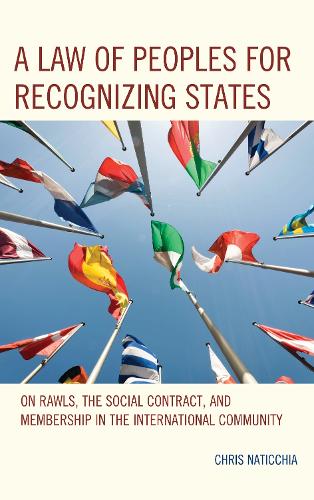
A Law of Peoples for Recognizing States: On Rawls, the Social Contract, and Membership in the International Community
(Hardback)
Publishing Details
A Law of Peoples for Recognizing States: On Rawls, the Social Contract, and Membership in the International Community
By (Author) Chris Naticchia
Bloomsbury Publishing PLC
Lexington Books
2nd November 2016
United States
Classifications
Professional and Scholarly
Non Fiction
320.51
Physical Properties
Hardback
294
Width 157mm, Height 238mm, Spine 23mm
558g
Description
Which political entities should the international community recognize as member statesgranting them the rights and powers of statehood and entitling them to participate in formulating, adjudicating, and implementing international law What criteria should it use, and are those criteria defensible From Kosovo, Palestine, and Taiwan to South Sudan, Scotland, South Ossetia, Abkhazia, and Catalonia, these questions continuously arise and constantly challenge the international community for a consistent, principled stance. In response to this challenge, Chris Naticchia offers a social contract argument for a theory of international recognitiona normative theory of the criteria that states and international bodies should use to recognize political entities as member states of the international community. Regardless of whether political entities adequately respect human rights or practice democracy, he argues, we must recognize a critical mass of them to get international institutions working. Then we should recognize secessionist entities that suffer from persistent, grave, and widespread human rights abuses by their governmentand, under certain conditions, minority nations within multinational states that seek independence. We must also recognize entities whose recognition would contribute to the economic development of the least well-off entities. Drawing on the social contract tradition, and developing a broadly Rawlsian view, A Law of Peoples for Recognizing States will both challenge and appeal to a broad readership in political philosophy, international law, and international relations.
Reviews
What criteria should determine which states the international community recognizes Should we set strict minimum standards or be flexible in the interest of bringing lagging states along in their progress toward justice Should we recognize states that have seceded from other states, and under what conditions These are the weighty questions Naticchia (California State Univ., San Bernardino) addresses in this work. Beginning from a starting point of John Rawlss Law of Peoples, the author first provides a multichapter review of the criticism of Rawlss social contract theory of international justice. The author concedes much of the criticism and, as a solution, seeks to transform Law of Peoples into a theory of state recognition rather than of international justice. While the review of criticism may be useful to the unfamiliar, it is a lengthy and arguably unnecessary windup for a project that stands on its own merits. That is, the author largely succeeds in creating a Rawlsian theory of recognition. He does so, insightfully, by placing recognition in the realm of Rawlss nonideal theory for, if the community of nations were operating in the ideal realm, the question of recognition would be moot. Summing Up: Recommended. Upper-division undergraduates through faculty. * CHOICE *
This book is a very deft application of moral philosophy to the difficult practical question of which claimants to statehood ought to be internationally recognized. It is bound to generate lively discussion among students of political theory, international relations and international law. -- Mikulas Fabry, Georgia Institute of Technology
In this engaging book, Chris Naticchia develops an original theory of international recognition out of a critical interpretation of John Rawls. In addition to showing that recognition is an important topic in its own right, the book marks a fresh departure for the Rawlsian tradition and shows how political philosophy can combine ideal and non-ideal theory. -- Michael Green, Pomona College
In elaborating a novel interpretation of the project that Rawls undertook in The Law of Peoples, Chris Naticchia's ambitious book makes a strong case for the significance of Rawls's work to the evaluation of the present-day practice of recognition of states. Those who have come to dismiss normative theorizing's relevance to international relations owe it to themselves to consider Naticchia's contribution. -- Brad R. Roth, Wayne State University
Author Bio
Chris Naticchia is professor of philosophy at California State University, San Bernardino.
